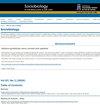Capixaba蚂蚁物种清单远未完成:对蚂蚁(蚁科)的地方规模评估揭示了多样性研究和昆虫学收藏的重要性
IF 0.7
4区 农林科学
Q4 ENTOMOLOGY
引用次数: 0
摘要
大西洋森林是巴西第三大生物群落,采样最多,蚂蚁物种多样性排名第二。然而,这些数据在空间上非常不均匀,大西洋森林的中心区域得到了更好的采样。从巴伊亚州南部到里约热内卢北部有一个明显的缺口,包括整个圣埃斯皮里托州。了解到这一生物多样性差距,在这项工作中,我们列出了沉积在自然保护区Coleção Entomológica的蚂蚁动物群(膜翅目、蚁科),该保护区位于圣埃斯皮里托省林哈雷斯市。CERNV从1984年8月收集了143只蚂蚁,隶属于8亚科29属63种。在143份记录中,94份是蚁工(66%),27份是蚁后(19%),22份是雄性(15%)。73%的蚁工已被确认,52%的蚁后和36%的雄性。沉积个体最多的物种是Camponotus sp.(15个记录)、Eciton burchellii(8个)、Atta sexdens(7个)、Neoponera villosa(7)和Solenopsis sp.(6个)。在已确认的蚂蚁中,有12种是在巴西圣埃斯皮里托州首次记录的。该藏品中仍有被视为濒危物种的绿底螺旋体的工作人员(可能还有身份不明的雄性)。我们可以观察到生物采集对当地和区域生物多样性知识的重要性,因为物种是在一个生物群落被广泛研究的州首次被记录的,这有助于填补林奈和瓦拉几亚的不足。本文章由计算机程序翻译,如有差异,请以英文原文为准。
Capixaba ant species inventory is far from complete: A local scale assessment of the ants (Formicidae) reveals the importance of diversity studies and entomological collections
The Atlantic Forest is the third largest biome in Brazil, the most sampled, and has the second highest diversity of ant species described. However, these data are spatially very heterogeneous, with the central region of the Atlantic Forest being better sampled. There is a visible gap from the south of Bahia to the north of Rio de Janeiro, comprising the entire state of Espírito Santo. Knowing this biodiversity gap, in this work, we list the ant fauna (Hymenoptera, Formicidae) deposited in the Coleção Entomológica of the Reserva Natural Vale (CERNV), located in the municipality of Linhares, Espírito Santo. The CERNV has 143 ants collected from August 1984, belonging to 63 species, 29 genera, and eight subfamilies. Of the 143 records, 94 are ant workers (66%), 27 queens (19%), and 22 males (15%). Seventy three percent of the ant workers are identified, 52% of queens and 36% of males. The species with the most individuals deposited are Camponotus sp. (15 records), Eciton burchellii (8), Atta sexdens (7), Neoponera villosa (7), and Solenopsis sp. (6). Among the identified ants, 12 species were recorded for the first time in the state of Espírito Santo, Brazil. The collection still holds workers (and probably unidentified males) of a species considered endangered, Dinoponera lucida. We can observe the importance of biological collections for the knowledge of biodiversity, local and regional since species are recorded for the first time in a state whose biome is widely studied, helping to fill in Linnean and Wallacean shortfalls.
求助全文
通过发布文献求助,成功后即可免费获取论文全文。
去求助
来源期刊

Sociobiology
生物-昆虫学
CiteScore
1.60
自引率
11.10%
发文量
28
审稿时长
3 months
期刊介绍:
SOCIOBIOLOGY publishes high quality articles that significantly contribute to the knowledge of Entomology, with emphasis on social insects. Articles previously submitted to other journals are not accepted. SOCIOBIOLOGY publishes original research papers and invited review articles on all aspects related to the biology, evolution and systematics of social and pre-social insects (Ants, Termites, Bees and Wasps). The journal is currently expanding its scope to incorporate the publication of articles dealing with other arthropods that exhibit sociality. Articles may cover a range of subjects such as ecology, ethology, morphology, population genetics, physiology, toxicology, reproduction, sociobiology, caste differentiation as well as economic impact and pest management.
 求助内容:
求助内容: 应助结果提醒方式:
应助结果提醒方式:


